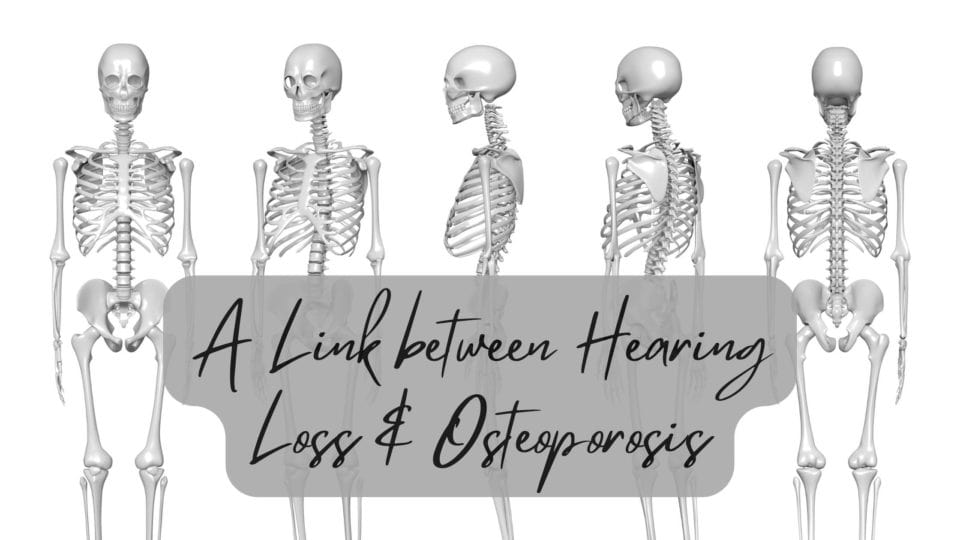- A Closer Look at Common Myths About Hearing Loss - May 7, 2024
- The Impact of Pets on Emotional and Hearing Health - April 26, 2024
- Strategies for Coping with Single-Sided Deafness - April 16, 2024
As we age it seems that our bodies require much more screening than when we were younger. For instance, osteoporosis often goes undiagnosed until an unexpected and mild fall leaves behind a significant break in the wrist, spine, or even hip.
Osteoporosis is a condition which causes loss of bone density and increases the risk of fractures and breakage. The Centers for Disease Control and Prevention reports that “Osteoporosis is most common in women; however, It affects almost 20% (1 in 5) of women aged 50 and over and almost 5% (1 in 20) of men aged 50 and over. “As with many conditions, osteoporosis becomes a greater risk as we age. Similarly, the risk of hearing loss increases significantly after the age of 65 to one in three. However, there are connections between the two conditions beyond the normal risk of increased age. Many specialists have identified a strong prevalence of hearing loss in patients diagnosed with osteoporosis.
What Causes Osteoporosis?
Our amazing bodies require our bones to be in a constant state of renewal for optimal strength. Even more fascinating, new bone is composed of old bone as it breaks down. In youth, it’s most often easy for your bone to create new bone mass and make it faster than it breaks down. As we age, this process inevitably slows down but for some people, bone breaks down faster than it can replenish itself. Peak bone mass is partly inherited and partly based on lifestyle. However, the higher your peak bone mass, the more bone you have stored for later in life, reducing your risk as you age.
Understanding How Hearing Works
Many people are surprised to find out that there are also bones in your auditory system which may be affected by the breakdown of bone mass. The outer ear collects audio vibrations and sends them to the eardrum. The eardrum then sends the sound to the middle ear where three of the smallest bones in the entire body are called the ossicles. Ossicles then send the sounds to the inner ear where the fluid-filled snail-shaped cochlea contains tiny hair-like cells called stereocilia. Stereocilia then convert the audio vibrations into electrical pulses which send the sound to the brain for processing. The auditory system is incredibly fragile, and any interruption can create permanent hearing loss.
Studies Linking Between Hearing Loss & Osteoporosis
In the case of hearing loss often the ossicles in the middle ear can become weakened by osteoporosis. A 2015 study published in The Journal of Clinical Endocrinology & Metabolism highlighted the high prevalence of hearing loss in people who suffer from osteoporosis.
Researchers at the Chi Mei Medical Center in Taiwan examined data from a national health database, comparing 10,660 people diagnosed with osteoporosis between 1998 and 2008 to 31,980 people without osteoporosis. They concluded the study in 2011 and found that those with osteoporosis were 76% more likely to develop sudden hearing loss. In addition, they determined that women with osteoporosis, in particular, were 87% more likely to develop sudden hearing loss.
Co-author of the study, Dr. Kai-Jen Tien explained, “a growing body of evidence indicates that osteoporosis affects not only bone health, but the cardiovascular and cerebrovascular systems… Our findings suggest sudden sensorineural hearing loss can be another broader health problem connected to osteoporosis.” Based on this study indicates that if you suffer from osteoporosis, it’s important to consider hearing loss as a serious risk that needs to be screened for.
Risk Factors for Osteoporosis
Many risk factors can’t be modified such as gender, age and ethnicity, and family history. However, some lifestyle choices can lower your risk. Some lifestyle choices include low calcium in your diet throughout your life. Calcium-rich foods include beans, leafy greens, dairy-rich foods, and nuts. Excessive alcohol consumption and tobacco use also increase your risk.
How to Protect Your Hearing with Osteoporosis
If you have osteoporosis, it’s essential that you screen for hearing loss regularly. If you already have hearing loss, while there is usually no way to reverse it, it’s important to treat it. Treating hearing loss allows you to be more aware of the people and the world around you, staying more active and healthier for years to come. Contact us today to schedule an appointment.

